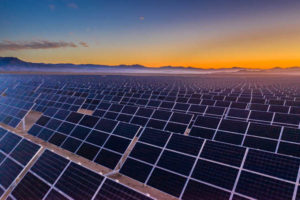
Aerial view of hundreds of solar energy panels in rows along the dry lands at Atacama Desert, Chile. By abriendomundo @ Shutterstock.com
In Foreign Policy, Benjamin N. Gedan attempts to make the case that American taxpayers should pay for South America’s renewable energy revolution. Currently, it’s against the law for the U.S. to fund many of the countries in South America because they make too much money. But Gedan has found a loophole he wants to use to spend even more taxpayer dollars building solar plants in places like Uruguay. The rules were broken, explains Gedan, for European countries to help them build new energy infrastructure as a result of the war in Ukraine. Gedan wants to break the same rules, despite there being no emergency in South America, to fund wealthier nations there. He concludes:
That said, the newest U.S. development office, the International Development Finance Corporation (DFC), supposedly has a broader mission. Established in 2019, the DFC is designed not only to fight poverty but also to provide alternatives to “state-directed investments by authoritarian governments”—in other words, Chinese loans. It does so through loans, loan guarantees, equity investments, feasibility studies, and technical assistance. Its high profile has led to expectations that the agency will be the primary U.S. tool to compete with Beijing’s Belt and Road Initiative, a priority for the United States and its G-7 allies. It has the capacity to make transformational investments in renewable energy.
Nevertheless, the DFC is required to prioritize low- and lower-middle-income countries, with rare exceptions. The DFC board includes a chief development officer. In Latin America, it does not operate at all in much of the Caribbean or in Chile, Panama, or Uruguay—three democratic U.S. partners that are well positioned for the “friend-shoring” of U.S. supply chains.
There are calls to make the DFC as well as the Export-Import Bank of the United States, more flexible lenders so as to more nimbly battle the China Development Bank and the Export-Import Bank of China. In practice, despite procedural barriers, the DFC already lends regularly to upper-middle-income countries for that purpose, so much so that anti-poverty advocates have complained of its “drift toward Foggy Bottom,” home to the U.S. State Department.
The U.S. Congress has already made at least one explicit exception. In 2019, to reduce European dependence on Russian oil and natural gas, lawmakers permitted the DFC to support energy projects in Europe regardless of a recipient’s per capita income.
It should do the same for renewable energy projects everywhere, and the White House should find other ways to finance renewable energy projects and drive private investment to that sector in all of Latin America, a battleground for great-power competition that has enormous renewables potential and great economic need.
Latin America’s renewables sector is expanding without significant U.S. support but not at the speed and scale necessary to meet the goals of the Paris Agreement. More than a quarter of its energy comes from renewable sources, twice the global average. At the same time, there are countless large-scale renewables projects marooned in boardrooms awaiting financing.
Although Uruguayan officials have come away empty-handed from meetings with the U.S. government, the country’s ambitious green hydrogen projects are moving ahead. China and European governments have expressed interest in furnishing equipment for electrolysis—to split water into hydrogen and oxygen—and for the production and use of synthetic fuels, obtained by mixing carbon monoxide and hydrogen.
But the country hopes to repurpose a vast array of oil industry infrastructure, and its reliance on public funds has slowed that transformation. “We see potential everywhere,” Horvath said.
If you’re willing to fight for Main Street America, click here to sign up for the Richardcyoung.com free weekly email.




